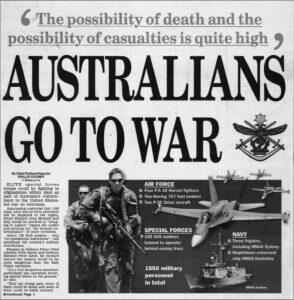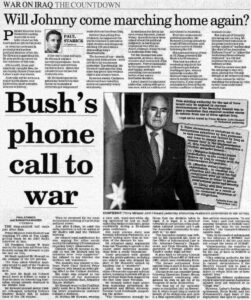
By Alison Broinowski, Declassified Australia, March 19, 2022
It’s much easier for Australian governments to send the Defence Force to war than it is for us to prevent that happening. They could do it again, soon.
It’s the same every time. Our governments identify the ‘threat’ with help from Anglo-allies, who name some enemy nation, and then demonise its mad, autocratic leader. The mainstream media join in, particularly supporting those oppressed by the autocrat. An event is provoked, an invitation contrived. The Prime Minister feigns it’s his melancholy duty, but gives the nod for war anyway, and off we go. People who protest are ignored, and so is international law.
Most Australians now recognise the pattern, and don’t like it. A Roy Morgan poll in 2020 found 83 percent of Australians wanted change in how Australia goes to war. In 2021 journalist Mike Smith found 87 percent of people polled supported the Greens’ bill for reform.
No better time than now to apply democratic restraint to belligerent leaders, you might think. Well, no. Federal politicians who responded to questions this year and last about the case for change have been evenly divided.
Predictably, almost all Coalition members oppose reforming the war powers, but so do several Labor leaders, while others are hesitant. The former and current Opposition leaders, Bill Shorten and Anthony Albanese, were asked, but have not replied, although the ALP has twice voted to hold an inquiry into how Australia goes to war in its first term in government.
This problem is not Australia’s alone. Since the 1980s, American and British politicians have been trying to reform the war powers which perpetuate the Royal Prerogative of past centuries, giving complete discretion over peace and war to the president or prime minister.
Canada and New Zealand, with Constitutions like Australia’s, have evaded the issue by staying out of most recent wars (though were involved in the post 9/11 Afghan conflict). New Zealand Prime Minister Ardern declined to discuss war powers reform with my organisation, Australians for War Powers Reform. Britain, with no written Constitution, has been trying for decades to legislate the convention that expects a prime minister to take a proposal for war to the Commons, without success.

US Presidents who decide to wage war are supposed to ask Congress to authorise the funds. Congress typically does so year after year, imposing few conditions. Some ‘emergency’ authorisations of military force (AUMF) are more than 20 years old.
In the two decades since 2001, the AUMF secured by George W. Bush for Afghanistan has been used to justify counter-terrorism operations, invasions, ground combat, air and drone strikes, extra-judicial detention, proxy forces, and contractors in 22 countries, according to the Costs of War Project. Repeated efforts for reform by Democrat and Republican congresspeople – most recently this year – cannot gather enough support to pass.
Australian governments are responsible for defending our continent, but it is catastrophically self-defeating for us to join expeditionary wars and provoke powerful nations. Many Australian respondents to the recent ‘Costs of War’ inquiry run by the Independent and Peaceful Australia Network (IPAN) agree with former Australian Prime Minister Malcolm Fraser that the greatest threats to Australia are US bases and the ANZUS Alliance itself.
The submissions to IPAN are almost unanimous: many Australians want democratic reform of the war powers, a review of ANZUS, armed or unarmed neutrality, and a return to diplomacy and self-reliance for Australia.
What then holds Australia back from war powers reform? Does it have to be so hard?
Many of us, of course, don’t think about how we go to war until it’s too late. Competing concerns – corruption in government, climate heating, living costs, and more – take priority.
Some are confident that ANZUS obliges the US to defend Australia, which it doesn’t. Others – including many politicians – worry about how we would respond to a military emergency. Obviously, this would be legitimate self-defence against attack, for which war powers legislation would provide, as is done in most nations.
Another concern is that politicians would ‘vote the party line’, or else the ‘unrepresentative swill’ in the Senate or independents on the cross-benches would have their way. But they are all our elected representatives, and if a government motion for war is too close to win, then the democratic case against it is too strong.
No-one has tried to amend the Constitution, which simply gives the war powers to the Governor-General. But for 37 years, Australians have been proposing changes to the Defence Act. The Australian Democrats tried in 1985 and 2003, and the Greens took up the cause in 2008, 2016, and most recently 2021. Australians for War Powers Reform, a non-partisan movement co-founded in 2012, has recently supported the effort with submissions to Parliamentary inquiries, creating a Veterans Appeal, and energising interest among some 23 newly-nominated Independents.
Politicians love to glorify our wars. But not one war before 1941 nor since has been fought in defence of Australia. Not one of our wars since 1945 – Korea, Vietnam, Afghanistan, Iraq, Syria – has resulted in victory for us or our allies. Each one has damaged us as a country.

No Australian government since Gough Whitlam’s in the 1970s has seriously challenged the Alliance. Every Prime Minister since 1975 has learned to shape its foreign and defence policies to accommodate the increasing demands of US hegemony. Our military are now so interoperable with the US that it will be hard to extricate Australia from the next war, except by a Parliamentary decision in advance.
Since the late 1990s, Australia has made many enemies, and few friends. Our reputation as a good international citizen has been trashed, and with it our repeated claim to ‘do what we say’ in multilateral meetings. In that time, we have downgraded our foreign service and diminished our diplomatic influence. The ‘diplomatic deficit’ deplored by the Lowy Institute in 2008 is much worse now. The loss of diplomatic standing would take years to recover, even if governments had any intention of prioritising peacemaking ahead of preparations for war.
Afghanistan, Iraq, Syria: Australia’s record speaks for itself. It’s bad enough to count the loss of blood and treasure, the disregard of Australia’s commitments to oppose the threat or use of force, under both the UN Charter and the ANZUS Treaty. Now, a legacy of hatred in the countries where we have fought in this century marks where we have been.
As the Ukraine war shows us, conflict can be sparked all too easily. As the risk of a war provoked with China rises, this is the time to reform the war powers, and to do much more.
Only by urgent changes to our foreign and defence polices can Australia hope to repair the nation’s standing in the world.
Dr Alison Broinowski AM is an Australian former diplomat, academic and author. Her books and articles concern Australia’s interactions with the world. She is President of Australians for War Powers Reform.









One Response
Well done Allison! Having been watching this space seriously since 1972, I endorse the truth of every aspect of this article.